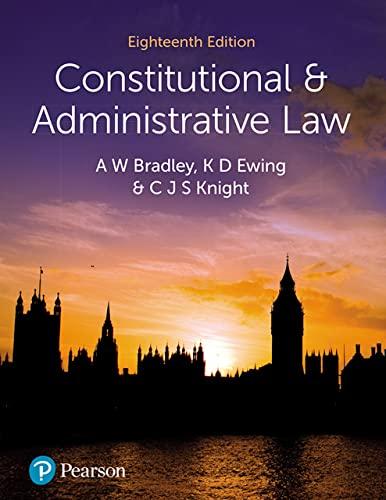Question
Apply the ruling in Regina v. Cribbin to the following fact situation by answering the 3 questions posed below. In answering the questions, draw parallels
Apply the ruling in Regina v. Cribbin to the following fact situation by answering the 3 questions posed below. In answering the questions, draw parallels between the situation of Tom, Larry and Jerry and the case of Regina v. Cribbin and refer to the relevant passages in the Regina v. Cribbin decision that support your arguments. Failure to draw appropriate parallels between cases and provide relevant quotes will result in loss of marks.
Tom and Larry decided to go to a local bar to celebrate Tom's birthday. They consumed 2 or 3 beer. Upon leaving the bar, Tom and Larry encountered Jerry in the bar alley. Jerry made a few derogatory comments about Tom's appearance. Tom gave Jerry a hard kick in the stomach and Jerry collapsed on the ground, started gasping for air and spat up some blood. Larry said to Tom that Jerry was faking it and punched Jerry several times in the head until Jerry stopped moving. Tom and Larry then left Jerry lying on the ground and walked away. A passerby noticed Jerry lying in the alley and called the ambulance. Unfortunately, by the time the ambulance arrived at the scene Jerry had died. Medical evidence showed that although the kick by Tom and the subsequent beating by Larry was enough to cause Jerry bodily harm that was not trivial, the actual reason for Jerry's death was an asthma attack that Jerry suffered while he was rendered unconscious by the beating. The asthma attack, which was precipitated by the assault, caused Jerry to choke to death. The actual injuries inflicted upon Jerry by Tom and Larry were in themselves non-life-threatening. Neither Tom nor Larry knew that Jerry was a long-time asthma sufferer. Larry pled guilty to second-degree murder, and Tom was charged with manslaughter. However, Tom claimed that he should be acquitted because he certainly did not mean to cause Jerry's death. In fact, Tom claimed that Jerry's death was caused by Jerry's asthmatic condition, rather than by Tom's actions. Tom stated that if the court found that he had "caused" Jerry's death, it would amount to punishing a morally innocent person.
Question 2a: Can the charge of manslaughter be laid against Tom, even if his actions were not the "sole cause" of Jerry's death (Jerry died of an asthma attack, which was a pre-existing condition)?
Question 2b: What is the requisite mens rea for manslaughter? Do you think that Tom met this requirement?
Question 2c: Tom claims that he is "morally innocent." A similar argument was made by the counsel for the appellant (Mr Cribbin) in Regina v. Cribbin. It was argued that the causation test articulated in the case of R v. Smithers infringed upon principles of fundamental justice in s.7 of the Charter, namely the principle that morally innocent should not be punished. However, the Ontario Court of Appeal rejected this argument and upheld the constitutional validity of the causation test articulated in R v. Smithers. How do you respond to Tom's claim that he is "morally innocent" using the Ontario Court of Appeal reasoning in Regina v. Cribbin. In your discussion, refer to the interaction between the principle of causation and the principle of fault in criminal law.
answer these questions in detail.
Step by Step Solution
There are 3 Steps involved in it
Step: 1

Get Instant Access to Expert-Tailored Solutions
See step-by-step solutions with expert insights and AI powered tools for academic success
Step: 2

Step: 3

Ace Your Homework with AI
Get the answers you need in no time with our AI-driven, step-by-step assistance
Get Started


